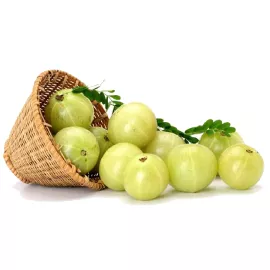
Amla also called Amalaki in Ayurveda or Indian Gooseberry has been used in Indian medicines for centuries to ward off diseases.
More About Gooseberry
Gooseberry is native to India and has an extremely sour taste. In Ayurveda, it is believed that fresh Amla balances the 3 doshas in the body i.e., Kapha, Pitta and Vista. The citrus fruit is consumed in various forms in India like pickles, juice, chyawanprash, murabba or candies as it has multiple health benefits.
Nutritional Fact
100 grams of fresh Gooseberry contains:
- Dietary fibre: 5g
- Calories: 48
- Carbohydrates: 10g
- Water: 86g
It is highly rich in Vitamin C, approximately 478mg and also contains Vitamin A, and Vitamin B6.
Health Benefits (Amla Khane Ke Fayde)
- Though Amla is sour, but reduces acidity, cures gastric, ulcers, heartburn and acid reflux.
- Rich in fibre content, it cures abdominal diseases and constipation.
- It fights infections and prevents cough and cold.
- The antioxidants in Gooseberry strengthen the immune system and protect from cancer, heart disease and diabetes.
- Rich in Vitamin C, also increases collagen production in the body and makes the skin radiant and youthful.
India and Amla
Four Varieties of Amla are grown in India:
- Banarasi: has a short shelf life.
- Chakaiya: a smaller variety of amla, mainly used for making candies.
- Francis: Francis or Hathijhool Gooseberry has a high yield and is frequently used.
- Wild Himalayan Amla: it is well adapted to cold temperature
Storage
It should be consumed with 2-3 days or can be stored in a Ziploc bag and refrigerated for a week.
Other Information
Country of Origin: India
Sourced and marketed by: Pureroot

only after purchasing from Pureroot





